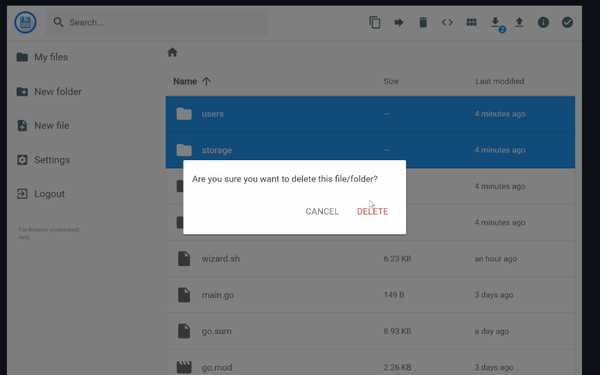Top 11 Embedded Single-file Databases for Various Development Needs
A single file database is a database that stores all its data within a single file on the file-system. This design simplifies management, distribution, and deployment. Examples include SQLite and Microsoft Access.
These databases are suitable for lightweight applications, mobile apps, and embedded systems where simplicity and ease of use are prioritized over the advanced features of larger database systems.
In our development work, we utilized various single file databases for mobile development, IoT apps, and desktop apps. We primarily relied on NeDB, LowDB, SQLite, and Realm. These databases have demonstrated reliability and good performance, though each is suited to specific use cases.

Benefits of Embedded Single-File Databases
1- Zero Configuration
Most embedded databases are designed to work out-of-the-box with zero or minimal configuration, making them user-friendly and reducing the time needed to get started.
2- Simplicity and Ease of Use
Embedded single-file databases are often straightforward to set up and use, requiring minimal configuration. They are ideal for developers looking for a quick and easy solution for data storage.
3- Portability
Since the entire database is contained within a single file, it is highly portable. You can easily move the database file between different systems or include it in application deployments without complex setup procedures.
4- Reduced Overhead
These databases typically have lower overhead compared to traditional server-based databases. They don’t require a separate server process, making them lightweight and reducing system resource consumption.
5- Performance
Embedded databases can offer excellent performance for many applications because they run within the same process as the application, reducing latency associated with inter-process communication.
6- Self-Contained Applications
Embedded databases allow for the creation of self-contained applications that include all necessary components, including the database. This can simplify deployment and distribution.
7- ACID Compliance
Many embedded databases support ACID (Atomicity, Consistency, Isolation, Durability) properties, ensuring reliable transaction processing and data integrity even in embedded environments.
8- Flexibility
They are suitable for a wide range of applications, from mobile and desktop apps to IoT devices and small web applications. Their versatility makes them a go-to choice for many development scenarios.
9- Local Data Storage
Ideal for applications that require local data storage without the need for network connectivity. This is particularly useful for offline-first applications and scenarios where constant internet access is not guaranteed.
10- Cost-Effective
As open-source solutions, many embedded single-file databases are free to use, providing a cost-effective alternative to commercial database systems. This can significantly reduce the total cost of ownership for small projects and startups.
11- Scalability for Small to Medium Applications
While they might not be suitable for large-scale enterprise applications, embedded single-file databases can efficiently handle the needs of small to medium-sized applications, making them scalable for a significant range of use cases.
12- Security
Being self-contained, these databases reduce the attack surface compared to client-server architectures. Security measures can be more straightforward to implement since the database resides within the application's environment.
Open-source Single File Database
1- SQLite
SQLite is a self-contained, serverless, zero-configuration database engine. It is a C library that implements a lightweight, disk-based database. SQLite is widely used for its simplicity and efficiency, making it ideal for embedded systems, mobile devices, and small-scale applications.
It stores the entire database in a single file, requires minimal setup, and supports standard SQL queries. Its reliability, portability, and ease of use have made it a popular choice for developers.
Features: ACID-compliant, supports most SQL standards, zero-configuration, cross-platform.
Use Cases: Mobile apps, embedded systems, local storage for applications.
2- LiteDB
LiteDB is a lightweight, open-source NoSQL database designed for .NET applications. It stores data in a single file and uses a BSON format. LiteDB is serverless, easy to deploy, and supports LINQ queries. It is suitable for small to medium-sized applications, offering fast performance, ACID transactions, and a simple API for developers.
Features: ACID transactions, LINQ support, no configuration required, BSON format.
Use Cases: .NET applications, small to medium-scale data storage, prototyping.
3- Realm
Realm is a mobile database designed for simplicity and speed. It supports both iOS and Android, providing real-time data synchronization. Realm is easy to use with a rich object-oriented API and does not require an ORM. It is suitable for offline-first apps and handles complex data structures efficiently.
Features: Object-oriented, reactive architecture, cross-platform (iOS, Android, .NET), real-time sync capabilities.
Use Cases: Mobile apps, real-time data applications, offline-first applications.
4- UnQLite
UnQLite is an embedded NoSQL database engine. It supports key-value store and document store models. UnQLite is serverless, lightweight, and requires minimal setup, making it ideal for embedded systems and applications needing fast data storage. It operates without a separate server process and provides high performance and flexibility.
Features: Key/value store and document store models, ACID transactions, zero-configuration.
Use Cases: Embedded systems, IoT devices, applications requiring a simple key-value store.
5- H2 Database
H2 Database is a Java-based SQL database. It can be embedded or run in client-server mode. H2 is fast, lightweight, and supports standard SQL. It is suitable for Java applications, offering in-memory and disk-based tables.
Features: Supports in-memory and persistent storage, small footprint, comprehensive SQL support.
Use Cases: Java applications, development and testing environments, lightweight production systems.
6- NeDB
NeDB is a lightweight, JavaScript-based NoSQL database for Node.js. It stores data in JSON files and supports basic querying and indexing. NeDB is ideal for small applications and rapid development, offering an easy-to-use API and in-memory or persistent storage options.
Features: In-memory or persistent storage, MongoDB-like API, indexing, supports Node.js and Electron apps.
Use Cases: Web and desktop applications, rapid prototyping, small-scale applications.
7- LowDB
LowDB is a small, JavaScript-based JSON database for Node.js and browsers. It uses a simple file-based storage system and supports querying and data manipulation through a straightforward API. LowDB is ideal for prototyping, small projects, and low-overhead applications.
Features: In-memory or persistent storage, simple and fast API, powered by lodash, flexible schema.
Use Cases: Small projects, configuration storage, lightweight local databases.
8- RocksDB
RocksDB is a high-performance, embedded key-value store developed by Facebook. It is based on LevelDB and optimized for fast storage and retrieval of data. RocksDB supports advanced features like transactions, column families, and fine-tuned performance options, making it suitable for high-throughput and low-latency applications. It is widely used in data-intensive systems and applications requiring efficient storage solutions.
Features: Optimized for fast storage, supports key-value pairs, advanced configurations for performance tuning.
Use Cases: Applications requiring high performance for read and write operations, large datasets.
9- DuckDB
DuckDB is an in-process, columnar SQL OLAP database management system. It is designed for fast analytical query performance and can be embedded in applications.
DuckDB supports complex queries, ACID transactions, and integrates well with data science tools. It is suitable for analytics workloads on both small and large datasets, offering high performance and ease of use.
Features: Supports complex queries, columnar storage, single-file storage, SQL support.
Use Cases: Analytical workloads, data science, in-app analytics.
10- PouchDB
PouchDB is an open-source JavaScript database designed to run in the browser. It enables applications to store data locally and sync with CouchDB or compatible servers. PouchDB supports offline functionality, replicates data between devices, and uses a simple API. It is ideal for web and mobile apps that require offline capabilities and real-time data synchronization.
Features: Synchronizes with CouchDB and other compatible servers, supports local storage, JSON-based.
Use Cases: Offline-first applications, web and mobile apps requiring sync capabilities.
11- TinyDB
TinyDB is a lightweight, document-oriented database written in pure Python. It stores data in JSON files and provides a simple, easy-to-use API for managing data. TinyDB is schema-less, allowing flexible data storage and supports querying, indexing, and basic CRUD operations.
Features: Lightweight, developer-friendly API, Schema-less design, minimal dependencies, extensible
Use cases: Small apps, prototyping, configuration, IoT, and desktop apps
If you are looking for a flat-file database we got you covered with the following article

In conclusion, ten notable open-source embedded single file databases include SQLite, Realm, NeDB, LowDB, LiteDB, UnQLite, H2 Database, RocksDB, DuckDB, and PouchDB. Each offers unique features and benefits, making them suitable for various applications, from mobile development to IoT and desktop apps, ensuring reliability and performance across different use cases.






